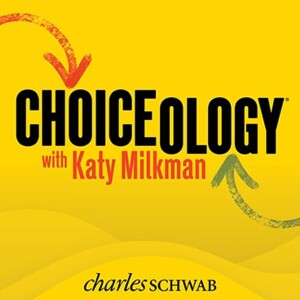
The Lucky Loonie: With Guests Peter Jordan, Trent Evans & Don Moore
 2019-09-09
2019-09-09
There’s something satisfying about the close door button in an elevator, especially when you’re in a rush. However, it turns out that most of those close door buttons aren’t actually connected to anything; they have no effect. So why are they there?
In this episode of Choiceology with Katy Milkman, we explore a quirk in the way people understand their ability to influence certain events.
The 2002 Winter Olympics in Salt Lake City were a watershed moment for the Canadian men’s and women’s hockey teams. The men’s team hadn’t won a gold medal in 50 years, and the women’s team had never won gold, coming up short in prior Olympic events. The Canadians were facing powerhouse American teams, so they needed every advantage they could get.
Enter Trent Evans. He was part of the Olympic ice-making team, though his allegiance was with the Canadians. During the initial ice making process, he marked the center of the rink with a small artifact in hopes that it would bring good luck to the Canadian teams. That artifact came to be seen by many as a key ingredient to success in the gold medal games.
Broadcaster Peter Jordan covered the games for the Canadian Broadcasting Corporation and recounts the subterfuge involved in hiding the good luck charm. Peter was the host of the CBC television series It’s A Living for seven years.
Good luck charms and superstitious beliefs are common, but generally easy to disprove. Still, this tendency to overestimate one’s influence appears regularly, even among skeptics.
As an experiment, we had several volunteers roll a pair of dice in a simple board game scenario where they were aiming to roll a certain number to win the game. In almost every iteration of the experiment, our highly skeptical volunteers displayed this overestimation of influence.
To learn more about the reasons for this behavior, we invited Don Moore to talk about his research on the phenomenon. Don is the Lorraine Tyson Mitchell Chair in Leadership and Communication at UC Berkeley Haas.
To close the episode, Katy explores some of the contexts where this bias may impact important decisions in business and in life.
Choiceology is an original podcast from Charles Schwab. For more on the series, visit schwab.com/podcast.
If you enjoy the show, please leave a ⭐⭐⭐⭐⭐ rating or review on Apple Podcasts.
Important Disclosures:
All expressions of opinion are subject to change without notice in reaction to shifting market conditions.
The comments, views, and opinions expressed in the presentation are those of the speakers and do not necessarily represent the views of Charles Schwab.
Data contained herein from third-party providers is obtained from what are considered reliable sources. However, its accuracy, completeness or reliability cannot be guaranteed.
Diversification and asset allocation strategies do not ensure a profit and cannot protect against losses in a declining market.
The Schwab Center for Financial Research is a division of Charles Schwab & Co., Inc.
(0919-9AR2)
More Episodes
Create your
podcast in
minutes
- Full-featured podcast site
- Unlimited storage and bandwidth
- Comprehensive podcast stats
- Distribute to Apple Podcasts, Spotify, and more
- Make money with your podcast
It is Free
- Privacy Policy
- Cookie Policy
- Terms of Use
- Consent Preferences
- Copyright © 2015-2024 Podbean.com




